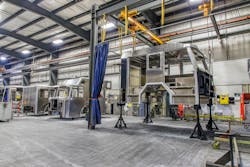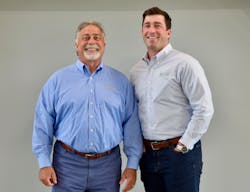Marion Body Works plans for success with succession plan
While the whipper-snappers on social media may enthusiastically welcome the retirement of the #boomer generation (or, less politely, anxiously wait for those over 60 to get out of the way), the business reality is not just a matter of clever quips about age-group rivalry. Indeed, for family-owned companies—no matter how well the idea of a transition is supported by once-and-future CEOs—an ill-prepared leadership handoff could damage decades spent building customer relationships, peer recognition, and bottom-line success.
“Families have rich histories, of which they are understandably proud, and sometimes they hold onto legacy assets simply because they’ve been in the family forever and shaped its identity,” explained Jennifer Pendergast, a clinical professor at the Kellogg School and director of the Center for Family Enterprises at Northwestern University. “But to succeed as an enterprising family, you have to be relevant in the marketplace.”
Staying relevant has been a battle Marion Body Works has been waging since 1905. The in Marion, Wis.-based company, now on its third family of owners, started as a blacksmith shop that made milk carton wagons and now manufactures truck chassis for the commercial vehicle, emergency response and defense sectors. In 1964, it was the first body builder to use all aluminum on fire apparatuses. Lightweighting on box trucks is also a big concern as the last-mile segment grows and fleets are looking to bring weight down to improve fuel efficiency and soon battery range as well.
The thing weighing most on the mind of Curt Ignacio, Marion’s president and CEO, though, is how to transition the business to the next wave of company leaders. His father-in-law Bud Simpson bought the business in 1980. Ignacio started working there in 1988. He and Bud’s son James Simpson took over in 2003 as co-presidents. James, who was also CEO, died unexpectedly in 2012 in a car accident. Ignacio has led the company by himself ever since. With the announcement of his son Kevin Ignacio as director of business development, there appears to be a clear path of succession at Marion, which employs 290 people. Kevin was previously an intern at Marion back in college during the summers of 2012 and 2014.
FleetOwner’s John Hitch spoke with Ignacio recently about the benefits and challenges facing Marion Body Works as this succession takes place.
Hitch: When did you start to feel it's time for me to pass the reins?
Ignacio: I don’t know if I’ve gotten to that point yet. I’m 66. I’ve said I could go quite a few years yet. My father-in-law worked to 75. My wife probably would tell me I need to quit sooner and enjoy life. Over the next few years, I’m going to try and find time to make myself not be here on site. With technology, I can be located in a few minutes by phone or email or Microsoft Teams if something comes up and the team needs to bounce an idea off me.
Hitch: With so much changing in trucking equipment, do you see youth as an advantage to staying relevant?
Ignacio: That’s exactly the plan Bud, Jim and I had 30 years ago when the first grandchild was born. We decided any of the kids who want to come into the business in a management position must finish college and work somewhere else for at least three years before being considered for a job at Marion. We want them to come up with new ideas.
You get myopic. I need to have, for the good of employees and good of the company, other people who at a minimum challenge the ideas I am throwing on the table and push the buttons to see if they really work.
We have a lot of really good people here. Our turnover rate is about 1%. We only know the way we've done it because that's how we've done it. It’s important to have someone else to watch what we're doing and say, “What if we added something? What if we change this or moved it to somewhere else?”
That fresh set of eyes is going to be a great advantage to all the other folks who have been around up to 50 years.
We also put Kevin in business development because we thought that would give him the broadest way of being able to work on any project that we have here. There will be no doors that he couldn't open.
Hitch: What does it mean to be keeping the company family-run?
Ignacio: For people who have been here for 25 or 35 or 50 years, it’s important to know we are not for sale, we’re not going to close, that there's a family member who can keep this place going.
When Jim died, there was concern that I was going to sell the business. I made sure everybody knew that wasn't our plan, and it hasn't been our plan. We're going to honor Jim's memory, we’re not going to run and hide, we’re going to keep going and keep growing.
Hitch: And how important is that for your customers to know there’s a steward in place?
Ignacio: Kevin recently went with a team of six people to a big cab customer because I couldn’t go. This is his opportunity to meet one of our customers. He’s been on video conference with other customers. Some of them know him from when he was younger, from company functions with burgers and brats and that sort of thing.
It’s important for customers, as much as our employees, to know there is consistency, someone in charge. Kevin will know the history of the company and history with that customer, what’s important to them. Because someday, there will be somebody new with that customer and they won’t know the history. Right now that’s my job, and it will be his job to know here's how we got to today, here's why we got here, and here are all the things we’ve done to help that customer.
Hitch: What are some of the new things you’re doing to help customers?
Ignacio: Trying to take excess weight out of a truck. They want a smaller engine, lighter truck, more payload. I see the last-mile market going from 26 to 30-foot straight truck to shorter ones. And less CDL-rated trucks, because it’s harder to find CDL-rated drivers. And more refrigerated vans, more ran delivery stuff, more last-mile deliveries to homes.
Hitch: How do you feel positioned as you're going to need to cater to electrification and other zero and near-zero emissions powertrains?
Ignacio: For us, it’s understanding how to lighten up the body and make all the components work. Customers decide, and it’s up to us to learn about it and make sure we do everything we can in our design and in our build that makes it easy for them to service and maintain that trust.
The big thing to me is to be a master of listening to other customers. I learned that from my father: “Listen, listen, and then listen some more.” It’s about seeing the need and figuring out how can we make that happen?
Hitch: What are customers telling you?
Ignacio: They want lighter weights so they don’t need CDL drivers. They also want easier access in and out of the trucks, at the chassis and back of the truck. A lot of that stuff is going to end up being loaded and unloaded by hand.
Hitch: What do you hope isn't lost in transition?
Ignacio: I think the culture that we have here with our employee and the care that we have for the employees and the customer comes first. The things that are important to us are keeping the family employees here and the company here in the area. We’ve had the fifth employee since I’ve been here hit 50 years. I’m not sure we’re going to get another one.

